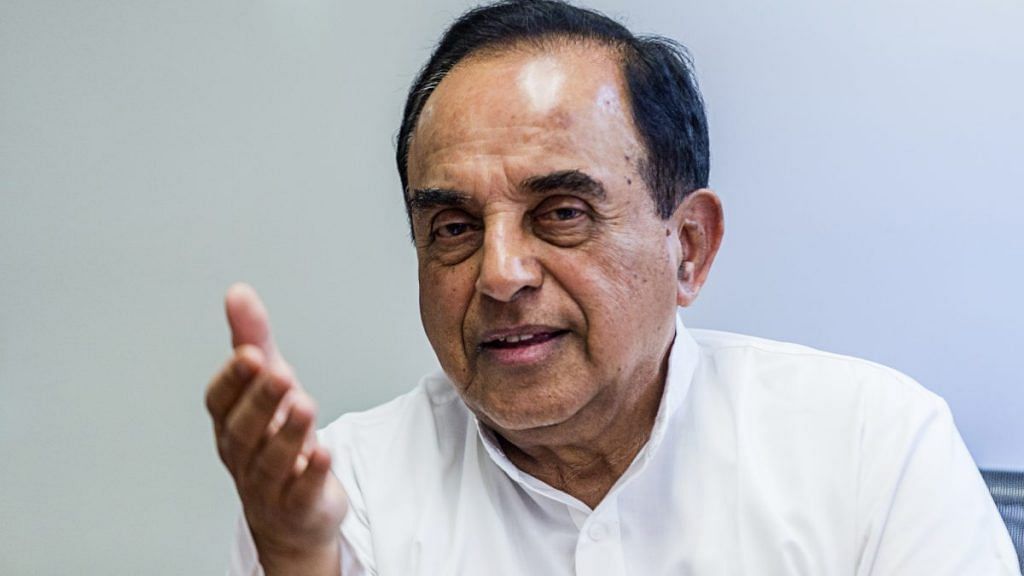Rajya Sabha MP Subramanian Swamy Tuesday tweeted confidently about how Prime Minister Narendra Modi’s second term would be without Shakuni, clearly referring to a powerful minister against whom he has long held a grouse.
Swamy loves to sprinkle his tweets and politics with characters from texts like the Mahabharata and the Ramayana. He famously uses Vishkanya and Tadaka to describe his political opponent. But perhaps he needs to go for an upgrade. Shakuni is no longer the villain you grew up hating – though Sadhguru calls Shakuni a “slimeball of a man”.
Author and mythologist Devdutt Pattanaik, however, offers a different take on this much-maligned character in Mahabharata. He refers to an old folk tale from Andhra Pradesh based on the epic, where the elders of the Kuru clan (from which Pandavas and Kauravas descended) put Gandhari’s entire family under house arrest. The story goes that Gandhari’s father realises the family will starve to death and decides that none but his youngest son would eat the little food they have. This son, Shakuni, would survive to take revenge.
“This folk story transforms the villain of the Sanskrit epic into a victim and an avenging angel. So who is Shakuni – a hero or villain? It all depends on the story we are told, and stories we choose to believe,” writes Pattanaik.
Also read: Our daughters will see Sita as a single mother and Draupadi as a #Metoo warrior
A new book, Shakuni: Master of the Game (Juggernaut), by journalist Ashutosh Nadkar, reinforces this theory, as he narrates the Mahabharata from his point of view. It also provides a psychological explanation for all his machinations and manipulations, which stem from his desire to avenge his beautiful sister Gandhari’s marriage to the blind Dhritarashtra, planting in him a lifelong desire to bring the great patriarch Bhishma to justice and a hatred for the Kurus.
The prince of Gandhara, Shakuni has a limp, is light-eyed, and is not trained to be a warrior. He does become a master of the dice, a wizard at backgammon, a quality that he finesses and which later helps his nephew Duryodhana win the kingdom of Indraprastha and all its possessions from the feckless Yudhishtra.
At every point though, his motivation is pure – to protect his sister, even if he uses any means of “deceit, duplicity and dissimulation,” writes Nadkar in his racy, revisionist retelling. Shakuni moves to Hastinapur, with his sister who chooses to wear a blindfold over her eyes, even as he masters “the art of looking like an innocent flower while actually being the deadly serpent that lay coiled beneath it”.
Also read: Hindu gods like Rama & Shiva have six packs now to kill bad guys, like American superheroes
In recent years, authors and cultural commentators have reinvented the epics for us, transforming their protagonists from the cardboard characters we watched in the Ramanand Sagar and B.R. Chopra versions on television. Nadkar’s book is one among a series from authors such as Chitra Banerjee Divakaruni and Samhita Arni, which re-examine the roles of central characters and give voice to hitherto forgotten, and supposedly marginal, characters such as Ravana’s sister Shurpanakha (Kavita Kane’s Lanka’s Princess) and Shantanu’s wife Ganga (Anuja Chandramouli’s Ganga: The Constant Goddess).
Shakuni is the latest to get OG treatment.
In fact, he is much like Tyrion Lannister, ‘The Imp’ from the just-concluded HBO series Game of Thrones, who does everything for the love of his queen, Daenerys Targaryen. He even advises Jon Snow (another Targaryen) to murder Daenerys so that she does not inflict any more death and destruction as she goes around “liberating the world”. In the finale of Game of Thrones, as he helps Westeros choose a new king, Tyrion says prophetically: “The sons of kings can be cruel and stupid… From now on, rulers will not be born. They will be chosen on this spot by the lords and ladies of Westeros to serve the realm.” He may as well have been speaking of Duryodhana. Like Shakuni, Tyrion is not a master of war, but overcomes his lack of military training to perfect his art of strategic thinking.
As he lies dying on the battlefield of Kurukshetra, cut open by Sahadeva’s sword, Shakuni has enough time to contemplate his actions and wonders why all his schemes are seen as treachery even today while Kaurava adviser Vidura’s are considered ethical strategies and Pandava tactician Krishna’s are regarded divine play. Shakuni asks himself and the reader: “Was I the vilest of villains in that epic story?”
For Nadkar, Shakuni is tragic rather than evil, constantly thwarted in his designs by Krishna. At one point, in frustration, the novel has Shakuni saying: “I realised there was no end to the depth of Krishna’s cunning,” whether it was placing Shikhandi as a shield in front of Arjuna when attacking Bhishma or persuading Arjuna to aim at an unarmed Karna.
But Shakuni acknowledges the biggest mistake of his life: that he did not condemn Duryodhana’s behaviour with Draupadi after the game of dice. And he ends his life on a philosophical note, which would do us all a world of good: “I realised, only belatedly, that my real fight was not with Bhishma’s might or Vidura’s wit. My true adversary was God.” That is, Krishna.
Also read: Robots guarded Buddha’s relics in an ancient Indian legend
Perhaps, Swamy would like to reconsider his description of Shakuni as a villain. For Dhritarashtra and Duryodhana, and indeed his sister Gandhari, he could not have been a better protector and a more honest saviour.
Swamy is obviously getting ready to position himself for that plum position in the new government, even before the results are out. His weapons of mass metaphors are ready from the epics just ahead of the new season of the Twitter-bharata.
The author is a senior journalist. Views are personal.
